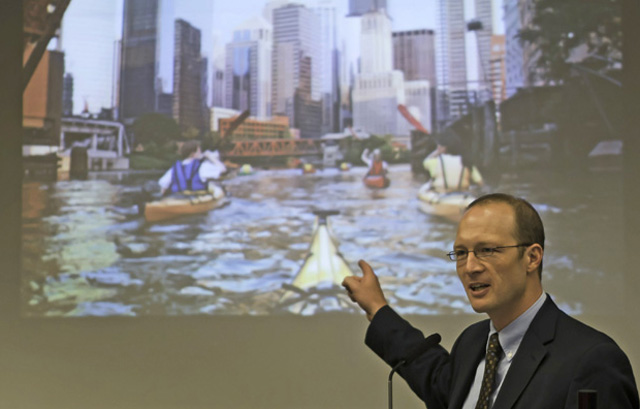Page 151 • (12,601 results in 0.05 seconds)
-
Seanna HewittI graduated from PLU in the spring of 2014 with majors in Biology and Hispanic Studies. A semester away in Oaxaca, Mexico led me to recognize my interest in promoting food security, and greatly influenced the avenue I took for my graduate career. I am now beginning my fourth year in the Molecular Plant Sciences PhD program at Washington State University, where I am studying the genetics and physiology of fruit ripening. As part of my thesis project, I am developing a set of
-
Mission StatementWe instill in all our students an appreciation for the evolution of biological diversity, a sense of amazement and curiosity about life and life processes, and an understanding of the scientific method used to satisfy that curiosity. We create an inclusive learning environment that encourages student-faculty collaboration and allows both students and faculty to achieve their full potential as scientists, independent thinkers, and globally responsible citizens. Professor Jacob
-
ScienceKevin Shen9OlympiaA Novel Approach to Biomimicking the Avian Tail on Fixed Wing Micro Air Vehicles 4th Claire Atkinson12Central KitsapThe Effect of A Green Roof's Plant Cover on its Ecological Benefits 2022 9-12 Place Awards CategoryPlaceNamesGradeSchoolProject Title Behavioral & Social Sciences1stMira Kunz11BellarmineThe Impact of COVID-19 On Adolescent Anxiety and Depression Behavioral & Social Sciences2ndAidan Moore12BellarmineThe Effect of Perceived Sex of Target on the Self-Disclosure of
-

, citing Chavez. “But as human beings, we have failed to take care of all creatures, and as Christians, we know we can do better than we’ve been doing,” in this regard. Rose McKenney, associate professor of geosciences, noted in her presentation that as the population grows, there is very little water to fight about. Of all the Earth’s water, only a small fraction – 2.5 percent – is fresh, and of that, only about .3 percent is available for human, plant and animal needs. The key questions facing humans
-
Founded in 1982, the Elliott Press is a hands-on workshop for students in PLU’s Publishing & Printing Arts (PPA) Program and for others interested in the history and artistry of the printed word. Students in the Elliott Press focus on traditional typesetting, printing, and bookbinding techniques as they create broadsides, artist books, and ephemera. But with the evolution of technology and aesthetics, some students also choose to use modern graphic design techniques in their work. Work by
-

J-Term 2020/Psychology & Political Science- Study Away in Prague Posted by: Marcom Web Team / January 3, 2020 January 3, 2020 J-Term 2020: Travel with us to Prague via our blog. PLU offers a variety of study away program options to make this important component of a PLU education accessible to as many students as possible. Narrow your search by exploring your options by academic discipline, location, duration and more. Visit the Wang Center for more info.Travel Blog Read Previous PLU Psychology
-
Course Title ANTH 101 Introduction to Human Biological Diversity - NW BIOL 111 Biology and the Modern World - NW BIOL 116 Introductory Ecology - NW BIOL 201 Introductory Microbiology - NW BIOL 205 Human Anatomy and Physiology I - NW BIOL 206 Human Anatomy and Physiology II - NW BIOL 225 Molecules, Cells, and Organisms - NW BIOL 226 Genes, Evolution, Diversity, and Ecology - NW CHEM 103 Food Chemistry - NW CHEM 104 Environmental Chemistry - NW CHEM 115 General Chemistry I - NW CHEM 116 General
-
especially encouraged to apply. Participating faculty offer research opportunities in biochemistry & structural biology; bioinformatics & computational biology; ecology & evolution; genetics; molecular, cellular, & developmental biology; neuroscience; and human biology. For more, see the SPUR 2018 Flier and visit spur.uoregon.edu. Read Previous University of Pittsburgh 2018 Summer Undergraduate Research Fellowship Read Next Application for the ACS Scholars Program Now Open! LATEST POSTS ACS Diversity
-

Names are Sacred Names Are Sacred Activity Guides Note Cards Three Names are Sacred Activities Overview These three Names Are Sacred story-sharing activities aim to explore the significance of names, their evolution, and their impact on individuals’ identities, especially within marginalized communities. Participants will engage in reflective discussions and exercises to understand the value of using chosen names and recognizing the dignity inherent in each person’s name journey. Objectives
-
animal or plant, researched its unique qualities, and put the species in context with their own identity and life history. Kinesiology major/Psychology minor Breeze Bartle introduces the hardy succulent Echeveria elegans. Link to Video Biology major/Environmental Studies minor Blake Clapp reflects on the resilience of the PNW’s coho salmon. Link to Video Business major/Dance minor Kei-Lynn Ono tells us about O‘ahu’s invasive coqui frog. Link to Video
Do you have any feedback for us? If so, feel free to use our Feedback Form.


